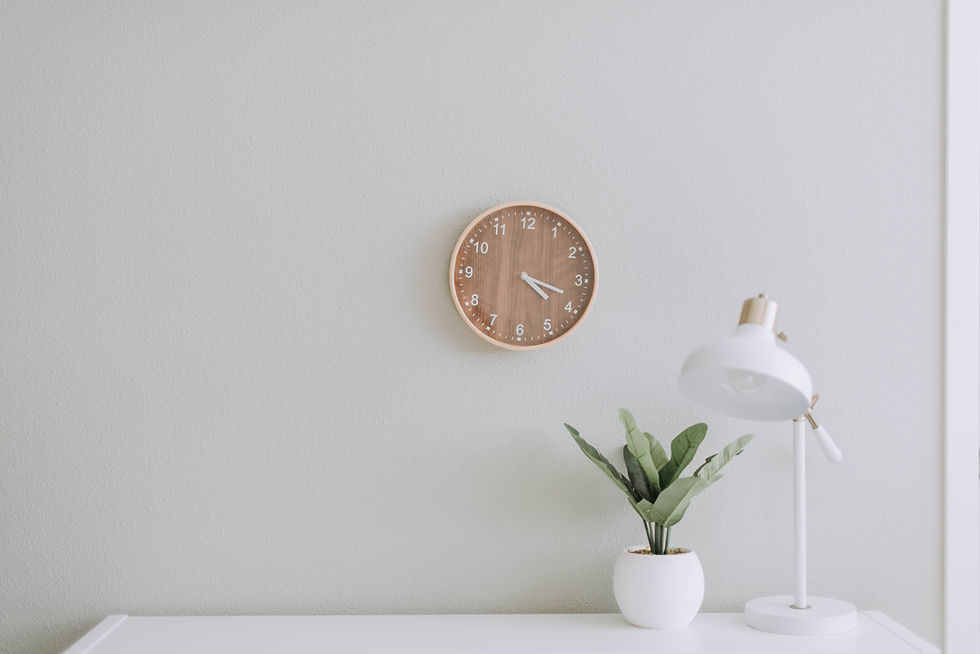Getting Basic about Self-Care
- WHV

- Apr 11, 2021
- 3 min read
The majority of society wakes up at that last moment in the morning (that moment where, if you wait any longer, you really could get in trouble for being late), causing one to choose a not so healthy breakfast (if there's any breakfast at all), running on fumes throughout the day, not taking breaks, only to come home and unwind to the repetition of stressful events throughout the day playing in their heads. This causes a domino effect of relying on quick, effective, but not so healthy habits such as over-indulging junk food, drinking sometimes to excess, or whatever hits the spot on some quick relaxation.
Our self-care is reactive. When self-care is reactive, it's often unhealthy. Let's look at the basics of setting ourselves up for good, sustainable daily self-care. This article will begin a series of blogs dedicated to looking at what self-care is and isn't, and today, we'll begin with the key elements.
Self-Care is every minute of every day.
Many think that self-care is about those massages, pedicures/manicures, or mini-vacations/shopping trips that somehow magically make up for the moments we've overworked ourselves. This is one small element of self-care. In fact, if you leave self-care up to these moments, you're more likely to over-indulge quick fixes to stress instead of proactively recognizing your needs every moment of the day. Shifting your mindset to self-care as a moment to moment discipline, not solely rooted in indulgence or "relaxation" can help you rethink your self-care strategies. For example, waking up early feels like a discipline, and not a fun one. But if you regularly give yourself an extra 30 minutes more than you currently do in the mornings, you'll notice that you're giving yourself space to do and be what is necessary before storming the day. Time to think, time to wake up, time to get a little breakfast or at least a cup of coffee, just time. Time and space are possibly the most important keys to self-care.
2. Self-care is about thinking ahead, not just recouping.
Self-care is about doing what you need to do to avoid constant crisis mode. Going back to reactive versus proactive, being in a constant reactive state of life will create a sense of always swimming up a waterfall. You are always just trying to ride the crashing waves until you can make it to a safe rock. If you're engaging in regular, effective self-care, you'll notice most of the effective strategies focus on reorienting yourself to a proactive state of being. Instead of waiting until the last day to complete a project before its deadline, you plan out your stages of completion ahead of time in measurable, reasonable stages. Some other examples might include strategies like meal prepping, actually doing/folding/putting away laundry on the weekends, or managing your time more effectively.
3. Self-care means you have to actually love yourself.
This one's a hard one right? Self-care means you're taking care of yourself the way you would take care of someone you're responsible for, like a pet or a child. Many people have such low self-esteem and self-worth, they can't engage in effective self-care because many things required for self-care also require that we consider ourselves worthy of that care. Taking time off work, calling in sick when you're sick, letting yourself have some alone time are all things that we tend to make ourselves work for instead of recognizing that sometimes these are needs--not rewards.
Try to look at your weekly schedule and habits. As you go through the series of self-care following this blog, you'll become a master of taking care of you. But for now, reflect on your reactive habits. Is there one thing you can change this week to test out better self-care? Some suggestions below:
Get the work you dread getting done, done first
Wake up 20-30 minutes earlier to give yourself extra space in the morning before work
Challenge yourself to meal prepping one meal throughout the week (such as, all your breakfasts or lunches)
When you take your lunch break, ensure you're not doing other work.
Set up a ritual (rituals will be discussed in another article!)
Let yourself cry out your stress
Take 2 minutes to breathe deep every day
Go to bed 20-30 minutes earlier than usual
Give yourself permission to take the day slow
Eat one healthy meal this week
Those are just tips to start! Don't forget to check out the forum and share your tips on self-care. We know you got 'em!




Comments